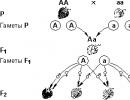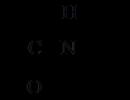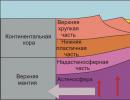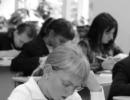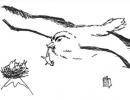How are points calculated for RT and CT? “University teachers are already climbing the wall. What's next?" Teacher - about calculating CT points How to calculate general CT points
Yesterday registration began for participation in an important event in the lives of today's applicants - centralized testing. It will end on June 1, and ten days later – on June 11 – the children will have their first exam in the Belarusian language. What will the 2019 entrance campaign be like, will the exam tasks and their structure change, how to score the coveted one hundred points, and is it possible to calculate the number of points scored yourself - our readers were able to find out the answers to these questions during the direct line. The editorial guest was the director of the Republican Institute for Knowledge Control (RIKZ) Yuri Miksyuk.

Structure and content
– Tell me, will the structure and content of the tests change with the new assessment system?
V. Linkova, Lida
– Of course, the content will change, because the same test cannot be repeated from year to year. The tasks will be new, but the structure of the test, of course, will remain unchanged, because it is determined by the test specification and approved by the Ministry of Education, determined by the program entrance examinations. In addition, and this is invariable, the amount of knowledge that we test corresponds to the materials school textbook, school curriculum.
– Will the test tasks become easier this year? Is it true that the material that is included in textbooks “for familiarization” will not be included in the tests?
S. Petrovsky, Baranovichi
– In order to properly and fairly assess the knowledge of applicants, a whole set of tasks of five levels of difficulty is used. Therefore, the structure of the test is preserved: there are tasks of the first, second, third levels of complexity. There are very difficult ones - the fourth and fifth levels. Their number has been preserved. In this regard, compared to last year, everything remains unchanged. The only thing I would like to emphasize is that we are constantly working to improve test tasks, in order to exclude additional questions, marked in textbooks with an asterisk. Make sure that even the wording of the test items is close to educational literature. To the extent that the color scheme of cartographic or other illustrative material is familiar to applicants. Comfortable conditions are created so that the applicant can demonstrate his knowledge. If we are talking about mathematics, the numbers should be selected in such a way that the calculations can be easily done in the mind, since calculators can only be used on tests in physics and chemistry.
– How do DH tasks on a reserve day differ from tasks on main days?
A.Ivanov, Minsk
– On this day, the applicant will receive a different version of assignments than on the main days. That is, we are not talking about the fact that tasks will be repeated. But this will be a test of the same structure, corresponding to the school curriculum.
You can register to participate on the reserve day at the registration point in your region, where the commission will consider documented valid reasons. Traditionally, testing will take place at the Belarusian State University. To take part in the CT on this day, the applicant must have a whole list of compelling reasons. Otherwise, you can skip a year.
However, not all applicants register correctly on main days. Don't forget, this year it will last until June 1st. Then the registration database is closed. I would also like to remind you that registration ends with the issuance of a pass to the testing point for a specific subject. Some applicants forget to pay and return with a document certifying this action in order to receive a pass in exchange. The main document to register and pass the CT is a passport (residence permit or refugee certificate). In case of loss or theft of your passport - a certificate in the prescribed form from the Ministry of Internal Affairs. Do not forget about the validity period of documents. And if it runs out, it’s better to take care in advance. Of course, you will be reminded about this at registration points.
Three we decide, five in our minds
– Is it true that by solving, say, three tasks, you can score 50 points out of a possible 70 or 80?
I. Livnev, Stolin
- No that's not true. For some reason, we stubbornly try to believe in miracles, and the secret to success in testing is hard work. And only those who prepared, studied year after year, systematically repeated educational material, can show good results. An averagely prepared applicant may well score 50 points, but look how many opportunities remain to reach one hundred! I can say that today’s scoring system not only fairly accurately assesses the knowledge of applicants, but also effectively ranks test takers based on their results.
– Is it true that if test scores increase, passing scores will also increase?
A. Ivanitskaya, Pinsk
– We can say that for those specialties where the passing scores were high, they will remain so. An applicant will not score more than one hundred points on the test. In addition, as the comparative assessment showed, both according to the previous method and the new method, the high scores of applicants will be the same. Passing scores may be higher than last year for those specialties where they were low.
– Is it true that with the new assessment method, weak students will win, and excellent students will score the same 70-80 points as with the previous system?
L. Ivleva, Grodno
– This is an established fact. The new assessment system, and this is the most important thing, will more accurately assess knowledge and establish fairness. If a person, for example, has average knowledge, he will receive the 50 points he is entitled to, and not 20, 30 or 40 points, as it could have been before. So, in the area of low and medium values, applicants’ scores will objectively become higher and will correspond to their knowledge. But starting from 70-75 points, the assessments using the old and new methods are almost the same.
– Will it change? maximum amount points that can be scored when passing the CT? If so, how much?
I. Konstantinov, Minsk
– Maximum score– a hundred, no other applicant will receive it. An applicant who will cope with all tasks and gain the maximum number primary points, will receive the maximum test score – one hundred points. Nothing will change in this regard.
– What can seriously reduce the scores on this year’s CT?
V. Sevko, Mozyr
- Nothing. Only the formula by which these points are calculated changes. On the contrary, this year the applicant will be assessed to the maximum. If previously there were tasks that were assessed in extreme positions, even if you partially completed them, today we have the opportunity to evaluate such an intermediate result and put it into controllable parameters. That is, even if there is one error in the answer, but if the task is partially completed, the new methodology allows such an answer to be counted.
Themselves with a mustache
– Is it possible to roughly calculate the result after participating in this year’s CT?
N. Efremova, Minsk
– The new assessment methodology will be so transparent that the applicant himself, knowing his test scores, will be able to calculate what percentage of the guys wrote the test better than him. Moreover, immediately after statistical processing results of all examinees will be automatically received and presented to the public on the RIKZ website, a conversion table of primary scores into test scores (for each task a primary score is established), according to which the applicant, without waiting for notification and being sure how many problems he solved correctly, will actually be able to calculate his test score.
– The child has an engineering calculator. Is it possible to use this for centralized testing in physics? Or should you protect yourself and buy a simpler device?
G. Kindruk, Minsk
– In accordance with paragraph 60 of the Regulations on the procedure for organizing and conducting centralized testing, approved by Resolution of the Council of Ministers No. 714 of June 6, 2006, when performing tests in physics and chemistry, “the use of a calculator is allowed, which is not a means of storing, receiving and transmitting information.” That is, the use of calculators with a different set of functions, including the so-called engineering or “scientific” ones, is not prohibited, provided that among these functions there is no such as storing, receiving and transmitting information. IN in this case We are talking about the presence of a built-in photo or video camera in the calculator, as well as the ability to connect it to other devices using Wi-Fi, Bluetooth and others to receive or transmit data. When taking tests, applicants will need to calculate only basic arithmetic operations (addition, subtraction, multiplication, division, calculation square root). So a simple calculator model will suffice. The decision to admit a specific computing device is made by the organizational commission of the centralized testing point.
Solid advantages
– What are the main advantages of this year’s introductory campaign?
R. Losev, Bobruisk
– Of course, the applicant will receive a more accurate assessment of his knowledge. This is a definite plus. And objectively it will be no less than using the old method. In addition, such a mark will be correctly compared with the school mark. And maybe not for everyone, but for most parents, the question will automatically disappear: why is the test mark so different from the school mark? In addition, it will be more correct to compare the results of CT from different years.
– Starting this year, applicants’ knowledge is assessed using a new assessment methodology. How did she choose from so many others? What are its advantages?
E. Dudin, Minsk
– Firstly, I want to say that the new assessment methodology is not a formula invented by us and has a serious scientific basis, a hundred years of experience in using different countries peace. All assessment methods existing today are divided into classical ones, like ours, and the younger IRT theory, which introduces the concept of a mathematically defined measurement of a unit of knowledge. But we made a choice towards the classical direction, since it has proven itself well. Secondly, the advantages of this method in comparison with the ranking carried out by the previous one, which was a type of percentage scale, is that now we have the opportunity not only to rank, but also to more accurately measure the knowledge of applicants in absolute terms. This approach makes it more correct to compare the result that an applicant shows on testing with his school academic achievements. And this is very important.
– Are there any plans to extend the validity of certificates to 3 or more years?
E. Lazovskaya, Gomel
– Today the certificate is valid for 2 years. That is, if you pass the CT in 2019, the CT certificate will be valid in 2020. This is already a lot. It is not a fact that if a person with an existing certificate did not enroll this year, he will be accepted next year. Maybe you should think about learning and improving your results.
– How do you feel about tutoring? And how much, in your opinion, does the result on the CT depend on the tutor?
N. Ivanitskaya, Loev
– Recently, a lot of people have resorted to the services of tutors. But in fact, and this is confirmed by examples of hundred-score students, it is quite possible to prepare for exams without outside help. Many successful guys prepared for the CT on their own. Another thing is that this needs to be done on systematically. And refresh your knowledge for exams. Studying school curriculum, CT collections, by participating in rehearsal testing, remote rehearsal testing on a free basis, where you can not only test your knowledge, but also practice your ability to fill out answer forms. I can say that traditionally the results of those who go through several stages of rehearsal testing, closing knowledge gaps, improve. Hard work is important here, given how high the stakes are. As for the number of participants in the rehearsal testing, we can say that it has stabilized. And this takes into account the fact that the number of school graduates is decreasing - we must not forget about the demographic factor. Over the past two years, we have annually passed up to 330 thousand human tests in rehearsal testing in three stages. I wish success to all applicants!
This year, 325 people passed the CT with 100 points. Pinsk, Malorita, Minsk - yesterday's schoolchildren from different regions showed the maximum result. Some have been preparing since 7th grade, others started a couple of months before X-Day. Some are ready to kick open the door of any university, others are afraid that they won’t get in. We talked with 100-point CT students about how to pass the 100% test, not die of happiness, and what to do next with these results.
“For the first time I learned what it was like to cry with happiness!”
Nastya Trubey scored 100 points each in the history of Belarus and English language. Now the gold medalist of the 6th Pinsk school is afraid to fly with the translation department of the Moscow State Linguistic University. A year ago, the passing score there was 381 - the girl now has a total of 384.
- I started preparing for English in September, I went to a tutor twice a week, who gave me a lot of tasks. I scored 80 points on the rehearsal test, so I didn’t expect a result of 100 on the CT! I took up history last summer, then I saw my RT result (80 points) and realized that it was time to go to a tutor too,- Nastya recalls.
She believes that in English she was lucky with the variant: it was not very difficult.
“There were moments when I doubted it, I checked it at home and everything turned out to be correct.” I was just worried, suddenly I accidentally put a cross in the wrong place,- says the Pinsk woman.
Nastya had more doubts about the history of Belarus. I came home and didn’t find answers to a couple of questions at all - she says she was very confused.
- In part A there was a question with cards - as for me, all the answers there are correct! When I was waiting for the results, I was very worried and still hoped for 100 points. I was afraid that there would be one stupid mistake. We had to wait a long time for English - the results were only available at about five in the evening. I couldn’t do anything, I was waiting for a text message! That’s when I first learned what it was like to cry with happiness! They cried with their mother.
The girl immediately called her tutor to thank her.
The applicant also took Russian and, just in case, social studies. Scored 85 and 86 points respectively. She says that she spent almost all her time preparing - even during the holidays she studied every day.

“It’s difficult to choose among such a range of specialties!”
But Vlad Yarmoshuk from Malorita didn’t bother much all year, but passed mathematics with 100 points. In the CT in the Belarusian language and physics, I made one mistake each. In total, the guy has 391 points. He graduated from the BSU Lyceum with a gold medal.
- I kept putting off preparation until later. At the first stage, RT got something like 77, at the second - the same, and at the third - even 75! Then I realized that it was time to come to my senses. Two months before the CT, I solved tests from previous years, and they prepared in class - there was no need for tutors,- says the guy.

He went to mathematics (Vlad speaks like an athlete) “to perform to the maximum,” but he hesitated: he didn’t know whether he would get “one hundred percent.” He recalls that he solved the test in an hour and a half, then solved it again: there were doubts about part B. He says that during the solution he was confident, but was worried about the result: what if he made a mistake due to inattention?
- I was a little disappointed that in Belarusian the score was not 100, but 96. It seemed easier to me than Russian, and my mother is a teacher, she helped me prepare. The math result came as a slight shock.
Vlad was the first to tell his friends about his success on VKontakte.
The applicant's average certificate score is 98. Now the guy has a dilemma between BSUIR (Faculty of Computer Systems and Networks) and BSU (Faculty of Applied Mathematics and Informatics) - he says that both are good, but he is afraid of making a mistake.
- My results are good, I still face a huge choice: it’s difficult to choose among such an assortment of specialties!- Vlad laughs modestly.
He advises future applicants to constantly solve tests from previous years and take all stages of the PT.
- In fact, this is an almost ready-made central heating system. And I went to it simply to solve good problems in the subject, and did not worry about the result,- he says.

“I corrected several answers 10 minutes before the end of the CT”
Minsk resident Lera Yesis passed the history of Belarus with 100 points - she has been closely connected with the subject since the 7th grade.
- My teacher helped me prepare for the Olympiads, and this year for the Central Test. I took notes and a reference book for testing Sharova and studied,- the applicant says that throughout June she studied three to four hours a day without a break.
At the rehearsal test, the girl received only 78 points: by that time she had not yet mastered the program for the 11th grade. But she came to the centralized one already in full combat readiness.
- There were tasks that I thought about for a very long time. I corrected something 10 minutes before the end of the CT. I checked everything at home and found no mistakes, but I was still afraid: what if there would be some minor mistake? Especially in tasks about the development of cities in the Polish-Lithuanian Commonwealth, which is not paid special attention to,- recalls the gold medalist of Minsk school No. 42.

She says that she has not yet fully understood the new scoring system (it has been actively criticized lately: supposedly you can guess at a good grade), but she is sure that this did not greatly affect the results.
- In principle, those who previously scored more than 80 took the same amount this year. The 20-pointers scored 40, but they are still not competitors for the first ones,- the girl reasons.
When Lera saw her result, she was very happy. Because of the surging emotions, it is now difficult for her to remember the details of that day.
- This is some kind of explosion - 100 points! I immediately called my teacher shouting “Hurray!”
In addition to the history of Belarus, she took the Belarusian (83) and Russian (86) languages, as well as world history (81). Her total score is 365, with which she is going to the history department of BSU. Last year the passing score was 318, so Lera will apply with a light heart.

“I slept a couple of hours a day all year - I solved eight tests a week”
Another Pinsk resident, Vita Kurgan, received 100 points in mathematics.
- I’ve worked hard since the beginning of the year, so I was counting on high result. At school they solved a lot of problems from previous years, but the tutor mainly helped - she took them in quantity. I slept a couple of hours a day all year: I sat on math! I solved eight tests a week!- recalls a graduate of the 12th Pinsk school.

The girl says that she went to all stages of the RT - at first she scored about 80 points, then it was up to 85.
- I am very inattentive, so I made mistakes. I was terribly afraid that this would happen again at the central heating center! Therefore, I checked and rewrote several times. When the text message with the result arrived, I opened it and just started crying! This is a very great happiness, because I had a lot of risks of making mistakes,- Vita speaks about his inattention.
Quick communication with the editors: read the Onliner public chat and write to us on Viber!
Reprinting Onliner text and photographs without the permission of the editors is prohibited. [email protected]
Minimum CT 2019 scores in Russian and Belarusian languages for all specialties, except philology, are 10 - 100 points. For future philologists, the CT language thresholds are higher - 25 - 100 points.
Minimum CT scores in the first specialized subject(mathematics, physics, chemistry, biology) - 20 - 100 points; on the history of Belarus, world history, geography, foreign languages— 25 — 100 points.
Minimum CT scores in the second core subject (mathematics, physics, chemistry, biology) - 10 - 100 points; in the history of Belarus, world history, geography, foreign languages - 15 - 100 points.
For certain specialties, the CT thresholds for the first and second subjects are lower than the specified points - 7 - 100. Certificates with such results will be accepted Military Academy of the Republic of Belarus, University of Civil Protection of the Ministry of Emergency Situations of the Republic of Belarus, Institute of Border Service of the Republic of Belarus, as well as military faculties civilian universities and upon admission to groups of specialties “Production, storage and processing of crop products”, “Animal husbandry. Fish farming. Beekeeping", "Rural construction and landscaping", "Reclamation and water management", "Agroengineering".
Save the infographic below so as not to get confused in the 2019 DH threshold estimates.



Note that minimum scores for differ. And for admission to educational establishments, which are subordinate to the Ministry of Defense, the Ministry of Emergency Situations and the State Border Committee, military faculties of civilian universities and for a number of agricultural specialties in the Central Center you need to score at least seven points.
Expectations that due to the new scoring methodology for the CT threshold points will increase, did not materialize. Central heating thresholds 2019 with last year's figures.
If the material was useful to you, don’t forget to “like” it on our social networks
Most applicants already know their centralized testing (CT) scores. This year, the Republican Institute for Knowledge Control (RIKZ) changed the testing assessment system, which is why applicants and their parents have many questions. Sputnik tried to answer the most common of them.
How much did the CT jobs cost?
This year, the RIKZ announced the “cost” of testing tasks in advance. Thus, a scheme for calculating “primary” points has been published, different for each subject.
For example, in Russian, correct answers to questions A1-A27, as well as A29 and A30 are worth two points, and partially correct answers are worth one point. Question A28 is also worth two points, and there is no such thing as a partially correct answer. For correct answers to questions B1-B6 they give two primary scores, and for B7-B10 they give two for correct and one for partially correct.
The scoring scheme is different for each subject. More details can be found on the RIKZ website.
What do the raw scores mean?
The primary score is the number of conditional points scored during testing. Later, based on the correspondence table, they are converted into a test score. It is this test score that is the final result.
How to find out what number of primary points corresponds to the test?
Why is there such a difference between scores?
Many applicants and teachers paid attention to the discreteness of the scores: that is, say, the next test score after 100 is 96. A similar situation occurs both at the beginning and in the middle of the evaluation table.
As the head of RIKZ Yuri Miksyuk said the day before, the number of tasks and, accordingly, primary points is limited. Therefore, a certain “gap” arises between the estimates. Otherwise, with the current assessment system, the CT would have to give more tasks. Therefore, with the new system, discreteness is observed.
Why is it so easy to score 20-40 points?
After implementation new system CT assessments and average scores in subjects increased. Many people have noticed that to get 20-40 points, that is, exceeding the minimum threshold, it is enough to give only a few correct answers.
As the RIKZ management explained, these points correspond to school grades, that is, 40 points is a conditional “four”, for which you don’t need to know much. At the same time, for 80 points you need to know much more, just like for a school “eight”, so at the CT for this mark you need to solve much more.
The RIKZ also claims that no one’s scores were “lowered”: for the same amount of knowledge, applicants receive similar grades on both the RT and the CT, regardless of the complexity of the tasks. Therefore, for many children, the marks on the rehearsal and on the centralized testing, as well as on the certificate, now coincide. The reason is that now the CT does not rank applicants among themselves, but is based on an absolute assessment of knowledge.
Why is it still possible to “poke”?
Indeed, you can score 40 points at random on the CT - but this depends on luck. Given the limited number of questions and answers, the likelihood of accidentally typing a certain mark remains, however, the RIKZ emphasizes that they are trying to combat this. Roughly speaking, in any test with closed questions, it is possible to randomly get the correct answers - but this will not bring high scores.
At the same time, applicants with scores up to forty are considered uncompetitive; their chances of successful admission are as little as those who scored 20 points in previous years.
Will admission scores to universities increase?
Due to an increase in average scores on the CT - first of all, in those specialties where they were not very high, including technical and pedagogical ones. How much they will grow is not yet known. At the same time, no significant change in passing scores in prestigious specialties is expected: the number of applicants with high scores remains the same as in previous years.


